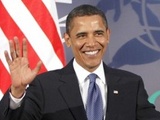|
|
TODAY.AZ / World news
Obama to Iran: U.S. offer of dialogue still stands
20 March 2010 [10:22] - TODAY.AZ
U.S. President Barack Obama renewed his administration's offer of dialogue and diplomacy with Tehran on Saturday, a year after his offer of a new beginning with Iran failed to achieve concrete results.
 Obama, who addressed Iranians in a new videotaped appeal to mark the observance of Nowruz -- an ancient festival celebrating the arrival of spring -- has pledged to pursue aggressive sanctions to prevent Iran from getting a nuclear weapon.
Obama, who addressed Iranians in a new videotaped appeal to mark the observance of Nowruz -- an ancient festival celebrating the arrival of spring -- has pledged to pursue aggressive sanctions to prevent Iran from getting a nuclear weapon."We are working with the international community to hold the Iranian government accountable because they refuse to live up to their international obligations," Obama said in the address, according to excerpts released by the White House.
"But our offer of comprehensive diplomatic contacts and dialogue stands," he said.
Iran, which has refused to halt its uranium enrichment program, denies it is seeking to build a nuclear bomb and says its nuclear program is aimed at generating electricity.
Obama said Washington was committed to a "more hopeful" future for the Iranian people despite U.S. differences with Iran's government.
During his first year in office, Obama marked Nowruz with a then-unprecedented message offering Iran a "new beginning" of diplomatic engagement with the United States.
But Tehran rebuffed Obama's gesture and relations soured further when Iranian authorities cracked down on opposition protesters after a disputed election last June, drawing U.S. condemnation.
"Over the course of the last year, it is the Iranian government that has chosen to isolate itself, and to choose a self-defeating focus on the past over a commitment to build a better future," Obama said.
"Even as we continue to have differences with the Iranian government, we will sustain our commitment to a more hopeful future for the Iranian people," he said.
Obama said the United States was increasing opportunities for educational exchanges for Iranian students to study at U.S. colleges and universities as well as working to increase access to Internet technology so Iranians could "communicate with each other, and with the world, without fear of censorship."
Obama's openness to engaging diplomatically with Iran if it "unclenched its fist" broke with the previous administration's policy of seeking to isolate the Islamic Republic, which President George W. Bush branded part of an "axis of evil."
Obama has not ruled out any options in dealing with Iran, the world's fifth-largest crude oil exporter, but U.S. officials have repeatedly made clear that their preferred option is diplomacy, given the difficulty of enforcing sanctions and the risk that military action could cause wider conflict.
The United States has agreed with Britain, France and Germany on a draft proposal for a fourth round of sanctions that would place new restrictions on Iranian banks and target the Revolutionary Guard and firms linked to it.
Washington has been struggling to win over China and Russia, both veto-wielding members of the U.N. Security Council and key allies of Iran, to agree to more aggressive sanctions.
In a development on Friday, Russian Prime Minister Vladimir Putin told visiting U.S. Secretary of State Hillary Clinton that Russian support for a new U.N. sanctions resolution was possible.
The United States, anxious not to undermine growing domestic opposition to President Mahmoud Ahmadinejad's government, has emphasized that any sanctions will be aimed at Iran's government, not its people.
"I want the Iranian people to know what my country stands for. The United States believes in the dignity of every human being, and an international order that bends the arc of history in the direction of justice," Obama said.
He said the United States wanted "a future where Iranians can exercise their rights, to participate fully in the global economy, and enrich the world through educational and cultural exchanges beyond Iran's borders. That is the future that we seek. That is what America is for."
/Trend News/
URL: http://www.today.az/news/regions/64530.html
 Print version
Print version
Views: 2097
Connect with us. Get latest news and updates.
See Also
- 26 December 2025 [22:25]
Korean tech firms reveal AI robots at CES 2026 - 26 December 2025 [21:23]
Türkiye launches national disaster program for kids - 26 December 2025 [20:19]
UK living standards expected to decline - 26 December 2025 [18:00]
Georgia requires health insurance for all foreign visitors from next year - 26 December 2025 [09:00]
China accelerates maglev flatcar to 700 km/h - 26 December 2025 [08:00]
Most reliable BMW models revealed - 25 December 2025 [23:27]
VP Y?lmaz highlights economic, security, climate agenda amid regional cooperation move - 25 December 2025 [21:49]
World’s tallest Christmas trees named - 25 December 2025 [21:23]
Afghanistan expands literacy centers nationwide - 25 December 2025 [20:22]
Ankara breaks new ground with state-led rental housing programme
Most Popular
 UN report debunks Taliban claims on terrorism, highlights persistent threats from Afghan soil
UN report debunks Taliban claims on terrorism, highlights persistent threats from Afghan soil
 ASCO’s “Koro?lu” tanker completes shipyard overhaul
ASCO’s “Koro?lu” tanker completes shipyard overhaul
 Pakistan’s expanding defence partnerships put Azerbaijan in strategic spotlight
Pakistan’s expanding defence partnerships put Azerbaijan in strategic spotlight
 Serbian President makes phone call to President Ilham Aliyev
Serbian President makes phone call to President Ilham Aliyev
 US Embassy commemorates anniversary of Azal plane crash
US Embassy commemorates anniversary of Azal plane crash
 Vision and achievements of President Ilham Aliyev - strategic leader shaping modern Azerbaijan
Vision and achievements of President Ilham Aliyev - strategic leader shaping modern Azerbaijan
 China opens robotics school for humanoid training
China opens robotics school for humanoid training
